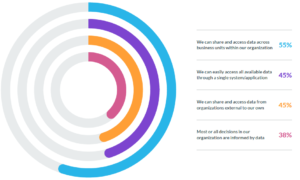
Why So Few Are Mastering the Data Economy

(Krikkiat/Shutterstock)
When it comes to the data economy, it’s early days still. There are big gaps between the types of data access and sharing activities that companies would like to be doing, what they are actually doing. That much was evident from this week’s Snowflake report titled “How to Win in Today’s Data Economy,” which showed meager private sector mastery of the data economy–but on the flipside, lots of room for growth.
Former Forrester analyst Jennifer Belissent, who is now Snowflake’s principal data strategist, was the main author of the report. She sought to explore to what extent companies are actually participating in the data economy (versus what they claim to be doing), and finding out what is holding them back.
The report is based on a survey of 1,000 data and IT professionals at companies in multiple industries located around the world, as well as interviews with Snowflake customers. The participants were asked questions like: To what extent do you base your business decisions on data? Are you able to share data internally? Do you share or access data externally? And how confident are you in the quality of the data?
“It was really about how do you participate in this broader movement that we’re seeing around the data economy,” she says.
At a high level, Belissent found very few companies that are doing everything well when it comes to participating in the data economy. In fact, only 6% of the companies Snowflake surveyed could be considered data economy leaders.
According to Snowflake, data economy leaders share these characteristics:
- They have unimpeded access to their data, no matter where it resides;
- They are using data to inform all or most of their business decisions;
- They are using data to advance strategic goals, such as growing revenue and identifying new business opportunities;
- They are able to share data securely with external partners.
Surprised that the number is so low? Not Belissent, who spent 12 years tracking data at Forrester. “Frankly I wasn’t that surprised,” she tells Datanami. “In terms of consistency with research that I’ve seen in the past, this study was pretty much on target.”

Particpating in the data economy is a mixed bag at the moment (Source: Snowflake “How to Win in Today’s Data Economy” report)
The survey identified several areas that companies are particularly weak when it comes to data economy participation.
“Skills came out as really one of the top obstacles. That’s not really that surprising. The talent barrier was the top one,” she says. “A lot of the challenges really remain in people and process side of things. Getting people to change the way that they’re thinking about technology.”
The survey found that 55% of all survey respondents stated they can share and access data across their business units within their organization, and found 45% said they’re able to externally share and access data.
“We’d like to see some higher percentages across companies with regard to the sharing, particularly the external,” Belissent says. “Ideally companies would be able to access their internal data and share data internally. I think that it should be higher.”
Other dichotomies emerged between data economy leaders and laggards. For starters, leaders are more apt to have clear data governance policies and goals than laggards (75% to 61%). Leaders are also much more likely to be able to access all available data through a single application or system than laggards (54% to 25%). Data literacy programs were also in place more often with the data leaders than the laggards (79% to 63%). And
That old bugaboo data quality also reared its ugly head. According to Belissent, companies in tech are more likely to believe their data. “If you’re going to be using your data, but you don’t have confidence in the quality of it, you’re not going to be using it for very long,” she says. “Decision makers are not going want to bet the farm on something that they don’t think is high quality.”

Some industries and sectors are doing better than others in the data economy (Source: Snowflake “How to Win in Today’s Data Economy” report)
Success in the data economy is also correlated with having a C-level sponsor–preferably a chief data officer (CDO)–helping to drive the data strategy. The report found 68% of data economy leaders had a senior-level person with overall responsibility for delivering on the data strategy, versus just 38% for the data laggards.
However, just about half of companies had a C-level person in charge overall. “That kind of leadership is something that we had hoped to see more up in organizations,” Belissent says.
Taken as a whole, the report shows there’s quite a bit of work to do before a wide swath of the real economy is participating in the new data economy. Snowflake, which runs a large data marketplace where customers can buy and sell data, is eager to be at the crossroad of this (hopefully) burgeoning market. But we’re not quite there yet.
“I think there’s still quite a long way to go,” Belissent says. “Like you said, not everyone can be a Snowflake customer, but I think that we’ve got the tools that we need to get there, ensuring that people do have access to their own data, at least their own data internally and then eventually external data. But I think that it’s we still have a long way to go.”
The report suggests it will take quite a bit of work to get to the point where a majority of companies are full participants in the data economy. Considering that we’re over a decade into this big data thing, should that be considered a failure? Belissent punts.
“One of the things that we’re seeing…from our customers is they were excited about investing in the infrastructure, but they’re recognizing that it takes more than that to actually move this forward,” she says. “And so questions about how to set up a center of excellence, how to put the right processes in place, how to establish a data governance council in order to mediate across different parties who own the data and want to make sure that other people are going to use it appropriately.
“Some of those process type questions are not necessarily a question of writing a check. It’s question of changing the way they operate,” she continues. “The people and process element that can be very challenging.”
You can access Snowflake’s “How to Win in Today’s Data Economy” here.
Related Items:
Data Culture Report: More Investment Needed, Alation Says
Frictionless Shopping at the Enterprise Data Store
All Eyes on Snowflake and Databricks in 2022






























